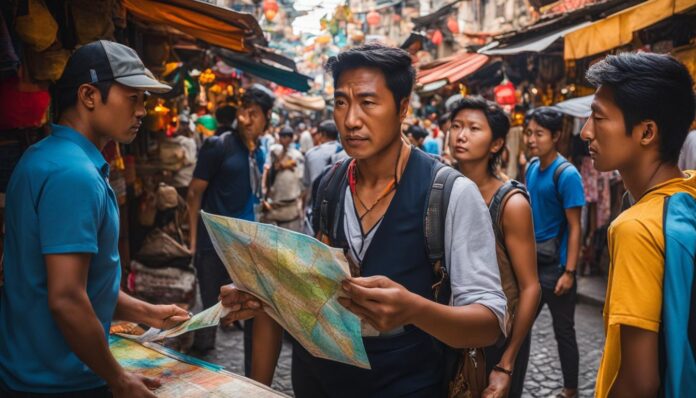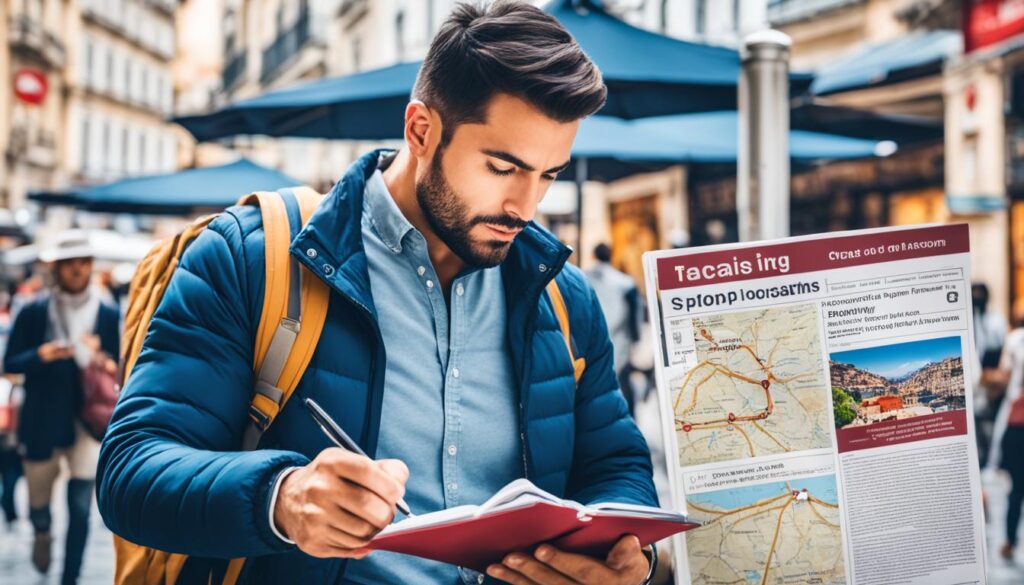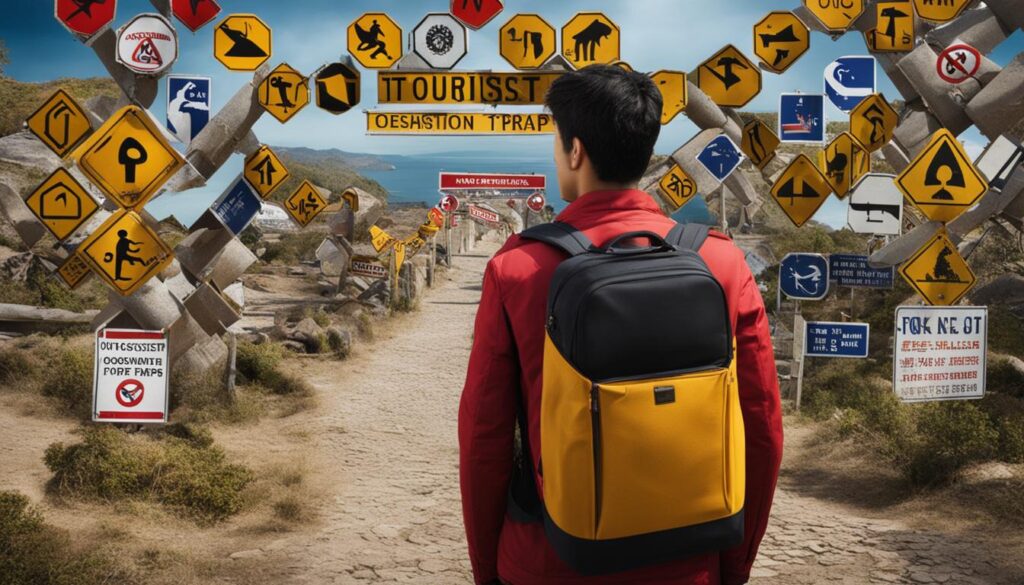Planning a trip to a new destination is always an exciting experience. Exploring new cultures, trying local cuisine, and visiting popular landmarks make traveling a fun and enriching experience. However, it’s also important to remain cautious and vigilant to avoid becoming a victim of travel scams. In this section, we’ll provide you with essential travel scam prevention tips and safe travel practices to help you stay safe and secure while traveling to different destinations around the world.
Whether you’re visiting an unfamiliar city, remote tourist spot, or a top-rated attraction, scammers often target tourists to steal their money or valuables. By following these tips for avoiding scams in specific destinations, you can significantly reduce the risk of falling prey to common travel scams.
Let’s get started with our travel scam prevention guide and learn how to protect yourself from these fraudulent activities.
Common Travel Scams in Popular Tourist Spots
As a tourist, it’s important to be aware of common scams in popular destinations to avoid falling prey to them. Here are some of the most frequent scams to watch out for:
| Scam | Warning Signs |
|---|---|
| Fake Tour Guides | The guide approaches you aggressively, speaks only limited English, or insists on taking you to specific shops or restaurants |
| Street Vendors | The vendor follows you, speaks aggressively, or tries to distract you while someone else steals from you |
| Counterfeit Currency | The shopkeeper or taxi driver claims that your money is fake and replaces it with counterfeit notes |
| Unofficial Taxis | The driver refuses to turn on the meter or negotiates an exorbitant price for the ride |
| Bait-and-Switch | The hotel or shop advertises a low price but charges a higher amount once you’ve made the purchase |
Learning how to spot the warning signs of these scams is critical to help ensure your safety while traveling. Stay alert, trust your instincts, and always do your research before engaging in any transactions with unfamiliar people or businesses.
Avoiding Fraud in Specific Locations
Traveling to new destinations can be adventurous, but it also poses some risks. In specific locations, scammers can take advantage of tourists and trick them into falling for their traps. To avoid fraud and scams, you need to stay alert and take some precautions. Here are some strategies to protect yourself from scams abroad:
1. Don’t Carry Valuables in Your Back Pocket
Keep your wallet, phone, and other valuables in a secure and concealed place. Pickpockets are common in areas where tourists gather. Be cautious in crowded areas or public transportation, where it’s easy for thieves to steal from unsuspecting travelers.
2. Research Authentic Local Services
Before arriving at your destination, make sure to research local services and venues. Use trusted sites and apps to book hotels, tours, and transportation services. If you’re engaging with tour guides, double-check their credentials and licenses to ensure they’re the real deal.
3. Be Wary of False or Overpriced Goods
In some tourist hotspots, fake or substandard goods are sold to unsuspecting travelers. To avoid being scammed, purchase items from trusted retailers or ask for recommendations from hotel staff. Also, be on the lookout for overpricing and haggling tactics, which could be an indication of a scam.
4. Use Trusted Transportation Services
Unofficial transportation services, like unlicensed taxis or rickshaws, can be risky. Always use trusted transportation services, like ride-sharing apps, or taxis with a meter. If possible, research transportation options in advance, so you can avoid scams and get the best deals.
5. Be Cautious of Unsolicited Offers
Scammers often approach tourists with unsolicited offers for tours, tickets, or accommodation. Be wary of anyone who approaches you on the street or makes a deal that sounds too good to be true. Stick to booked services and avoid giving personal information or money to strangers.
“Remember, being prepared and cautious is your best defense against fraud and scams while abroad.”
Table: Common Scams and Fraudulent Activities in Specific Destinations
| Destination | Common Scams and Fraudulent Activities |
|---|---|
| Paris, France | Street scams, pickpocketing, counterfeit retailers |
| Bali, Indonesia | Fake tour guides, overpriced transportation, credit card scams |
| Bangkok, Thailand | Tuk-tuk scams, gambling scams, fake goods |
| Rio de Janeiro, Brazil | Fake police officers, credit card fraud, taxi scams |
Always check for noticeable red flags, report any suspicious activity to the local authorities, and immediately seek assistance if in danger. By following these guidelines, you can enjoy your travels safely and avoid fraud in specific locations.
Researching Your Destination
Before embarking on your trip, it’s important to research your destination thoroughly to ensure a safe and scam-free journey. Here are some tips on how to protect yourself from scams abroad:
1. Check Travel Warnings and Alerts
Visit the U.S. Department of State website for updated travel warnings and alerts on your destination. These warnings can give you vital information on the security situation, scams, and fraud in specific locations.
2. Research Local Scams
Search for information on common scams in your destination, including online forums, travel blogs, and social media groups. This research can help you identify fraudulent activities and tactics used by scammers in specific locations.
3. Use Reliable Resources
Choose reliable resources, such as tourism boards and reputable travel websites, to gather information on hotels, restaurants, and activities in your destination. These resources can provide guidance on safe travel practices and precautions.
“Thorough research is key to avoiding scams and ensuring a safe trip. Make use of reliable resources and stay up-to-date on travel warnings and local scams.”
Staying Alert and Aware
While traveling, it’s essential to stay alert and aware of your surroundings to avoid falling victim to scams. Here are some practical tips to help you stay safe:
- Trust your instincts: If something seems too good to be true or makes you uncomfortable, it’s likely a scam.
- Be cautious of unsolicited offers: Don’t accept unsolicited offers for transportation, tours, or accommodation.
- Stay mindful in crowded areas: Crowded areas are a favorite spot for pickpockets and scammers. Keep your belongings close and your wits about you.
- Be wary of distractions: Scammers may try to distract you with a diversion, such as spilling something on you or causing a commotion, while an accomplice steals your belongings.
- Pay attention to common scams: Familiarize yourself with common scams in the area, such as fake police or ATM scams.
By staying alert and aware of potential scams, you can avoid falling victim to fraud and enjoy your travels with greater peace of mind.
Keeping Your Valuables Secure
One of the most critical ways to avoid fraud and scams while traveling is by keeping your valuables secure. Theft and pickpocketing can occur anywhere, but being aware of your surroundings and taking simple precautions can minimize the risk of theft or scams. Here are some tips to safeguard your belongings:
- Use luggage locks to secure your bags and deter unauthorized access.
- Carry a money belt under your clothing to keep your cash and important documents safe and close to your body.
- Avoid displaying valuable items like jewelry, cameras, and gadgets in public places.
- Keep your wallet in your front pocket or a secure bag, rather than in a back pocket where it’s easy to steal.
- Be cautious when using ATMs and avoid using them in isolated or poorly lit areas.
By staying vigilant and practicing safe travel practices, you can avoid scams and minimize the risk of theft or fraud while exploring new destinations.
Interacting with Locals and Tour Guides
Meeting locals and tour guides can provide a unique perspective on a destination, but it’s important to be cautious to prevent falling victim to scams in popular tourist spots. Always keep mindful of your surroundings and follow these tips to protect yourself:
- Only book tours and services from reputable sources. Research tour companies and read reviews before booking.
- Beware of locals who approach you on the street offering unsolicited services or directions. They could be trying to lure you into a scam.
- Be wary of tour providers who insist on cash payments or deposit requirements.
- Watch out for tour guides who pressure you into buying additional services or souvenirs you don’t want or need.
If something seems off, trust your instincts and walk away. Remember, it’s always better to err on the side of caution to protect yourself from scams abroad.
How to Verify the Credibility of Local Services
It’s essential to verify the credibility of local services to avoid falling victim to scams in popular tourist spots. Here are some ways to ensure the services you’re using are legitimate:
| Verification Method | Description |
|---|---|
| Online Reviews | Read reviews and ratings from previous customers to gauge the quality and reliability of a service. |
| Official Websites | Check the official websites of tour companies, transportation services, or attractions to ensure their legitimacy. |
| Referrals | Ask for personal referrals from friends, family, or accommodation staff for reliable and trustworthy services. |
By using these verification methods, you can ensure the services you use are reputable and trustworthy, minimizing your risk of encountering travel scams.
Avoiding Unofficial Transportation Services
One of the most common ways scammers target tourists is through unofficial transportation services. By falling into their trap, you might end up paying much more than the actual fare or even worse, become a victim of theft or any other scam. To protect yourself from such incidents, here are some tips:
- Book transportation in advance through reputable providers, such as your hotel or a known taxi company.
- Be wary of taxi drivers or touts who approach you at airports or train stations offering rides. Instead, look for official taxi stands or information booths.
- Research the local transportation options beforehand and check the average prices to avoid falling for excessive charges.
- Avoid using transportation services that refuse to use the meter or provide a fixed price before the trip.
- When using ride-sharing apps, such as Uber or Lyft, always verify the driver’s identity before entering the vehicle.
By carefully considering all of these tips, you can avoid falling into scams while using transportation services.
Using Secure Payment Methods
When traveling to a new destination, you need to be cautious when making payments to avoid falling prey to fraud and scams. Follow these tips for using secure payment methods:
- Use Your Credit Card: Avoid carrying large amounts of cash while traveling. Instead, use your credit card for transactions, as they are more secure.
- Be Wary of Unsecured ATMs: Ensure that the ATMs you use are secure and not located in areas where it’s easy for scammers to access your card information.
- Check Your Credit Card Statements: Regularly check your credit card statements for any suspicious activity. If you notice any discrepancies, report them immediately.
- Avoid Using Public Wi-Fi: Public Wi-Fi can be a gateway for hackers and scammers to access your personal information. Avoid logging onto your bank accounts or making payments while connected to public Wi-Fi.
By following these tips, you can ensure that your financial details remain secure while traveling.
Example Table: Comparing Payment Methods
| Credit Card | Debit Card | Cash | |
|---|---|---|---|
| Security | More secure, as you can dispute fraudulent charges | Less secure, as transactions come directly from your account | Less secure, as it can be easily stolen or lost |
| Convenience | Easy to use and widely accepted | May have transaction fees or limitations on use abroad | Might not always be accepted, especially in remote areas |
| Exchange Rates | Generally favorable rates with rewards and cashback options | May have unfavorable exchange rates and fees | Exchange rates can vary, and there may be fees for converting currency |
It’s important to weigh the pros and cons of different payment methods before traveling, depending on the location, type of trip, and your personal preference. Always remember to keep your financial information secure, and report any suspicious activity immediately.
Reporting Incidents and Seeking Help
Despite taking all necessary precautions, you may still fall prey to a travel scam. If this is the case, it’s essential to know how to report the incident and seek help immediately. Reporting the incident can help safeguard other travelers from falling victim to the same scam and assist law enforcement in detecting and prosecuting the responsible individuals.
If you’re traveling to a foreign location, it’s a good idea to have the contact information for the local embassy or consulate on hand. They can provide you with valuable assistance, including helping you find medical care, reporting incidents of crime, and acquiring replacement travel documents.
If you’re a victim of a scam or theft, contact local authorities immediately. They can help you file a report, connect you with local resources and aid in recovering stolen property. Keep in mind that some scams require you to act quickly, so don’t hesitate to reach out for help.
Remember, staying safe should always be a top priority when traveling. By knowing how to report incidents and seek help, you can make sure you have a worry-free journey full of unforgettable memories. Safe travel practices can protect you from fraud in specific locations.
Conclusion
By following the travel scam prevention tips and strategies outlined in this guide, you can significantly reduce the risk of falling victim to scams while traveling to specific destinations. Remember to stay vigilant, do your research, and always trust your instincts when it comes to your safety and well-being. Safeguarding yourself from scams will ensure you have a memorable and worry-free travel experience.
Remember to practice safe travel practices and be cautious when interacting with locals and tour guides. Keep your valuables secure and avoid using unofficial transportation services. Use secure payment methods and report incidents if you encounter a scam or become a victim. By taking these precautions, you can ensure that you avoid scams in specific destinations and have a hassle-free trip.
Don’t let the fear of scams and fraud ruin your travel experience. With the right knowledge and preparation, you can enjoy a safe and memorable trip without worry. Travel smart, stay safe, and have a great time exploring new destinations!

















































